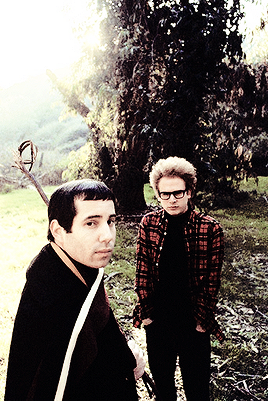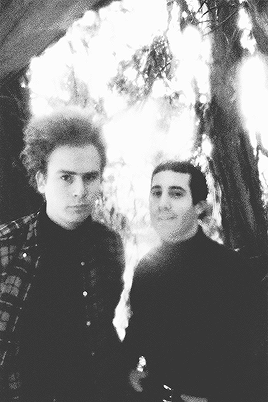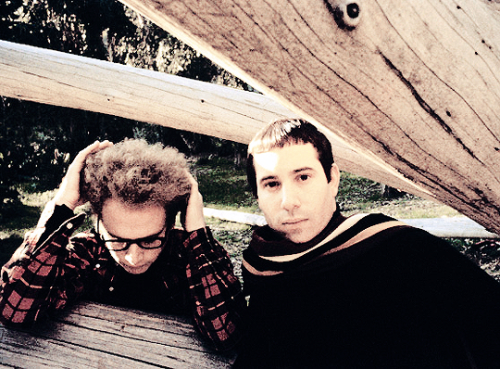
Daughter of Loki | Heart of Sekhmet | 36 yo, pagan since 2009 | Spider Witch | Selkie | Simon & Garfunkel addict
789 posts
If You Ask Me, The Harmony Game Is THE Documentary About Them. I Know It Only Covers Bridge, But It's
If you ask me, The Harmony Game is THE documentary about them. I know it only covers Bridge, but it's so interesting, with lots of people sharing their memories, and most of all respectful of everyone involved.
You do get the sense of a group of friends who loved music and enjoyed each others' company while creating it.
This is how I think about them, this is how I'd love the world to remember them in years to come.




For me, most of all, it has the vibe between Simon and Garfunkel, and when I look at it nowadays I go, “Gee, we were so bonded.” Our sense of humor is inside, we knew each other, what we’re talking about. It comes off nice on-screen, it’s like a scrapbook photo for me. It warms my heart to see this early Paul and Artie. - Art on the Songs of America television special.
-
 chloeissooocool liked this · 1 year ago
chloeissooocool liked this · 1 year ago -
 short-gayy liked this · 1 year ago
short-gayy liked this · 1 year ago -
 poem-poorly-written reblogged this · 1 year ago
poem-poorly-written reblogged this · 1 year ago -
 poem-poorly-written liked this · 1 year ago
poem-poorly-written liked this · 1 year ago -
 parsley-sage-rosemary-n-thyme reblogged this · 1 year ago
parsley-sage-rosemary-n-thyme reblogged this · 1 year ago -
 parsley-sage-rosemary-n-thyme liked this · 1 year ago
parsley-sage-rosemary-n-thyme liked this · 1 year ago -
 underthewirez reblogged this · 1 year ago
underthewirez reblogged this · 1 year ago -
 poem-poorly-written reblogged this · 1 year ago
poem-poorly-written reblogged this · 1 year ago -
 ourvisiontouchedthesky liked this · 1 year ago
ourvisiontouchedthesky liked this · 1 year ago -
 tailorsfaceandhands liked this · 1 year ago
tailorsfaceandhands liked this · 1 year ago -
 imissthevillagegreen reblogged this · 2 years ago
imissthevillagegreen reblogged this · 2 years ago -
 themitralop-blog liked this · 2 years ago
themitralop-blog liked this · 2 years ago -
 lifesbeencrazy liked this · 2 years ago
lifesbeencrazy liked this · 2 years ago -
 cwwonder reblogged this · 2 years ago
cwwonder reblogged this · 2 years ago -
 cwwonder liked this · 2 years ago
cwwonder liked this · 2 years ago -
 parasiticmoth liked this · 2 years ago
parasiticmoth liked this · 2 years ago -
 mangocheekscake liked this · 2 years ago
mangocheekscake liked this · 2 years ago -
 more-or-less-the-same liked this · 2 years ago
more-or-less-the-same liked this · 2 years ago -
 ellieonscreen liked this · 2 years ago
ellieonscreen liked this · 2 years ago -
 magichourmovies liked this · 2 years ago
magichourmovies liked this · 2 years ago -
 nayasdiary1 liked this · 2 years ago
nayasdiary1 liked this · 2 years ago -
 sweet-silver reblogged this · 2 years ago
sweet-silver reblogged this · 2 years ago -
 times-up-alone-tonight liked this · 2 years ago
times-up-alone-tonight liked this · 2 years ago -
 007waffles007 liked this · 2 years ago
007waffles007 liked this · 2 years ago -
 streetlights-all-turn-blue reblogged this · 2 years ago
streetlights-all-turn-blue reblogged this · 2 years ago -
 allinsideyourhead reblogged this · 2 years ago
allinsideyourhead reblogged this · 2 years ago -
 kelloggscornflake reblogged this · 2 years ago
kelloggscornflake reblogged this · 2 years ago -
 allinsideyourhead liked this · 2 years ago
allinsideyourhead liked this · 2 years ago -
 simoneandgarfunkelle reblogged this · 2 years ago
simoneandgarfunkelle reblogged this · 2 years ago -
 simoneandgarfunkelle liked this · 2 years ago
simoneandgarfunkelle liked this · 2 years ago -
 mondschein14 liked this · 2 years ago
mondschein14 liked this · 2 years ago -
 alexharley1901 liked this · 3 years ago
alexharley1901 liked this · 3 years ago -
 thecardiganslife1995album liked this · 3 years ago
thecardiganslife1995album liked this · 3 years ago -
 between-the-breaths liked this · 3 years ago
between-the-breaths liked this · 3 years ago -
 cliffburton liked this · 3 years ago
cliffburton liked this · 3 years ago -
 bridgeoverstrawberryfields reblogged this · 3 years ago
bridgeoverstrawberryfields reblogged this · 3 years ago -
 bridgeoverstrawberryfields liked this · 3 years ago
bridgeoverstrawberryfields liked this · 3 years ago -
 sweet-silver reblogged this · 3 years ago
sweet-silver reblogged this · 3 years ago -
 sweet-silver liked this · 3 years ago
sweet-silver liked this · 3 years ago -
 appleisms reblogged this · 3 years ago
appleisms reblogged this · 3 years ago -
 lennons liked this · 3 years ago
lennons liked this · 3 years ago -
 humphrey0617 liked this · 3 years ago
humphrey0617 liked this · 3 years ago -
 piblybibly liked this · 3 years ago
piblybibly liked this · 3 years ago -
 nomisong liked this · 4 years ago
nomisong liked this · 4 years ago -
 makegentlethelifeofthisworld liked this · 4 years ago
makegentlethelifeofthisworld liked this · 4 years ago -
 badscooter liked this · 5 years ago
badscooter liked this · 5 years ago -
 leafmealowne liked this · 5 years ago
leafmealowne liked this · 5 years ago -
 froyo-ravioli reblogged this · 5 years ago
froyo-ravioli reblogged this · 5 years ago
More Posts from Parsley-sage-rosemary-n-thyme
No hard feelings, just different worlds my ass.
Why couldn't he stick to this version of the story, instead of getting more and more resentful? Ffs.
Simon says
May 7, 1972
Pop singer Paul Simon talks
about women, psychoanalysis, being short, and life without Art Garfunkel.
BY SANDRA
PAUL SIMON-the pop music Paul
Simon, not the lieutenant governor, is 30, and the last few years have been rough on him. His partnership with Arthur Garfunkel is only a memory; Garfunkel is just a faded photo on the mantle, a relic of the days when there were Beatles and Peter, Paul, and Mary.
Simon is buried In the cozy comfort of an easy chair. He has a cold, and only the blinking of his watery eyes Indicates that he is alive. Coffee cups are scattered on the table and a woman s sweater dangles over a chair. He’s been married a year.
“The whole subject of the man-woman relationship is a big mystery to me,” Simon says nasally. “I question if there is not something basic in the male to make him sadistic, and something in the female to make her masochistic. Remember, there was rape long before capitalism.”
He pauses, reflects: “It is some- thing deep, very, very deep, which we can only ponder and hope to resolve. You know, I was saying the other day how it s funny that you don’t see mass murders of men by women. You never see a woman who goes around and kills five men. Why? I don’t think women would go and kill people. I think that s something crazy in men. You could say it s because women are weaker, but a gun, knife kills anybody.”
Both Simon and his wife are very much into the Women’s Movement. [“We’ve read our Kate Millet,” he says.l Simon insists he s fascinated by woman s potential. “You know,” be says, “it has come out recently that some of the great works credited to men were in fact done by women. John Stuart Mill freely admitted that his wife wrote his essay on Liberty and Freedom in Society. And a lot of art and literature actually has been the work of women. F. Scott Fitz- gerald, we can Infer from Nancy
Milford’s book on ‘Zelda,’ literally plagiarized his wifes diaries, and I’m sure that she won t be the last ripoff. But at least we know about it, are talking about it-we recognize that the problem exists.” Paul muses: “I’d like to see if the nature of a woman, which may be a little more kind and gentle, can produce changes and improvement. For instance, I’d like to see a woman as President,”
As if on cue, Peggy Ann-slim, clad in hippie-spiffy, softly southern [Tennessee] in voice and manner- emerges to care for her husband s cold. He takes his spoon of medicine without flinching. Peg projects a strength and sureness that is absolute, resolute.
Simon’s glance caresses his wife. “Peg has gotten me to face violent instincts which previously I couldn’t imagine letting out,” Paul says. “I thought it was the mark of civilization to keep it all inside. She comes from a whole other culture. When Peg’s angry, she lets it out-and then it’s over.”
The reality of being married-ao working things out-has had its effect on Simon’s music. Lost are his early innocence and belief in perfection. Lost, too, is his original folk sim- ; now he has an electronic, gospel sound. A song like “Congratulations” [written for his pal, Elliott Gould in honor of the actor’s second marriage asks, “Can a man and a woman live together in peace?” Certainly this is a different tune from the one Paul sang in “Dangling Conversation,” where lovers get along like “verses out of rhythm, couplets out of rhyme, in syncopated time” or “For Emily Whenever I May Find Her,” a delectable dream vision with soft rain, cathedral bells, and frosted fields.
Simon mentions his former side-kick, Art Garfunkel, and says firmly,”I won’t take another partner.” Garfunkel now teaches mathematics to high school students in Connecticut and moonlights as a movie star for director Mike Nichols. The pair seldom see one another anymore. “No hard feelings, just different worlds”, Paul explains. Arthur and Paul had been pals since boyhood. Simon still seems troubled about his split with Garfunkel, as seen in a new song, “Me and Julie Down by the School- yard.” The song reveals an antipathy toward the opposite sex for breaking up the old gang.
Simon denies any suggestion of homosexuality in the song. He and Garfunkel once were listed in a homosexual handbook. “I was very insulted by that,” he says flatly. He wants the world to know how happy he is, how much he loves his wife. Injustice is even harder for sensitive minstrel to reconcile when he lives in an elegant apartment.
Psychoanalysis has helped him to cope, he says. “In the beginning I would sit in the dark all the time writing songs which-I thought-came out of gut suffering. Embarrassment used to be my main emotion. I remember that I was embarrassed by what I said, what I did, how I looked, who I was. As I think back, that pain was not real pain. It was not the grief of someone who has felt real sorrow. It was imaginary, contrived, a student s fantasy, not the pain of poverty, war, or even the tremendous emotional pain that people endure dally.”
Simon’s latest songs show sympathy for the little guy: the rebel, the genius, the loner, the down-and-out [“Illusion dwellers”], and his Papa Hobo figures from rustic Americana. Paul admits his sympathy but ex- plains it from distinctly personal motives. “These songs, in effect, cloak my anxiety about being short.” He confesses: “Bet you ‘ve never seen a little guy the hero in a movie. If he’s short, he’s always the clown, the comic relief. I see it all the time. The funny thing is that I never wrote a song about being short, because I thought people would laugh. And I still believe they will laugh. So I tend to make my people out to be the little guy as opposed to the short guy.” Paul documents his case. “Recently, Time Magazine reported that the tallest men-not the brightest -in a graduating class at a college in Illinois were offered the best starting salaries by big business.” A look of consternation marks his face. ‘Tlbe whole white male myth makes it imperative that the hero, the winner, be the Great Dane [‘Unhand me, you big brute’]. That’s why I’m right there with the feminists, because I think the whole thing is debasing.
“It’s so hard to make it in the world, when you want it to be fair and it isn’t. It’s all a mixture. You get it for being a Jew and you get it for being black or white. You get it for being a woman and you get it because you live in a capitalist society, which feeds off other societies, so you can be wealthy. We all walk on both sides. We are all part of this mixed-up sense of injustice that there is in the world.”
Injustice is even harder for a sensitive minstrel to reconcile when he lives in an elegant duplex apartment, overlooking Manhattan’s Central Park, a pad formerly occupied by guitarist Andre Segovia. At least now Simon plays the role of rebel. Simon fans recognize the change between his isolation in “Sounds of Silence” [“Hello darkness, my old friend”] and the pseudo-alienation of the recent “Papa Hobo.”
The same Simon who was at first ignored by the folk vanguard because he was too “weird,” now has become a classic, a standard. Record sales are up there with Mancini and Sina- tra. Every Simon album is gold [there have been seven], and last year “Bridge Over Troubled Water” won the top . Simon’s made million-dollar singles with “Sounds of Silence,” “Mrs. Robinson,” “Bridge,” and “Cecilia.” Currently “Mother and Child Reunion” [from his first solo album} promises to be another golden great.
Back in 1955 when be was a teen- ager growing up in a middle-class environment, Paul despaired of achieving his ambition to be a pop singer. Elvis Presley was supreme and everything about him was alien to Paul Simon. But Paul wrote music, and the times changed, and what was out came in. His musical flexibility may well keep him in.
Paul leans against the coffee table. “You see this game here?” he asks, pointing to a tilt board with holes and a small metal ball. “Do you know rm the best in the world at this game? It’s the only thing in the world that I’m best at.” One senses Paul would prefer to be known as the tilt- board champ. It would simplify his life. Instead, he laments: “What do you do, how do you behave when you walk in the street and fans want auto- graphs or you buy a car and the salesman is obsequious? You know, my most bizarre fantasies became possibilities, everyday realities. Whatever happened to be my special trip was readily available. It was all too much.”
The past comes rushing back to him. “My insecurities made me un- comfortable with the drug scene. I like to get high, but it made me crazy. So I stopped. I had to stop. I can remember is a bunch of people running around. They were confused. I was confused. They didn’t know who they were. I didn’t know who I was, and we were all acting out some kind of role. And everything was weird and changing so fast. The ’60s-wow, what a decade!”
The way Artie looks at him sums up their relationship.


Dua Sekhmet ❤️🔥

Mother of the sun. Fury. Fire. Rage. Yet healing warmth protector. Gold. Carnelian. Lapis. Turquoise. Hot, dry air. Sweet perfumes and dried blood.



